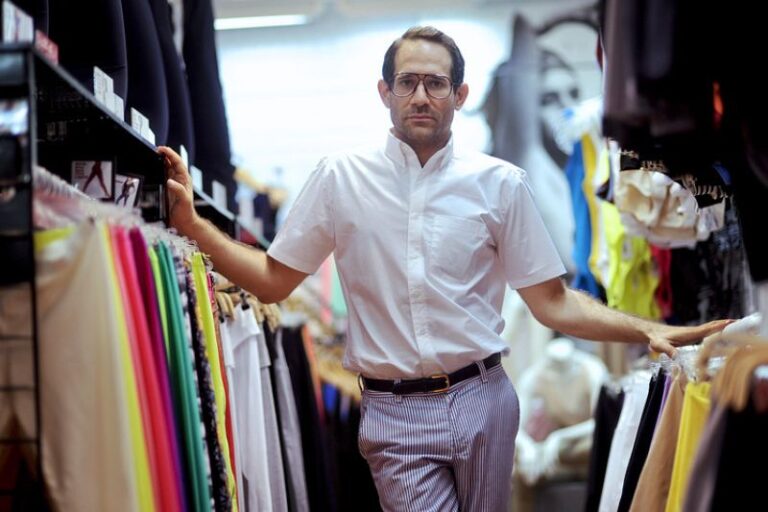Dov Charney’s name still sparks fierce debates in fashion circles. Once celebrated as the rebellious founder behind American Apparel, he built a clothing empire that broke rules, set trends, and pushed bold marketing like no other. But the same boldness that fueled his rise also played a big part in his dramatic fall. Today, at 56 years old, Charney’s net worth sits at about $500,000—an unimaginable drop from the days when he was worth an estimated $600 million at the peak of American Apparel’s glory.
Born on January 31, 1969, in Montreal, Dov Charney came from a creative household. His mother was an artist, his father an architect—an upbringing that shaped how he saw the world and, later, how he wanted to sell clothes. Even as a student, he was already dreaming big. While still in school, he started importing t-shirts to Canada and flipping them for profit. That early hustle hinted at the entrepreneurial fire that would soon make him a giant in retail fashion.
Dropping Out to Dream Bigger
In 1990, Charney made a move that would shock many parents—he dropped out of Tufts University after borrowing $10,000 from his folks. Instead of textbooks, he invested in blank t-shirts, launching what would grow into American Apparel. He chose South Carolina for the factory and poured himself into turning simple basics into a cultural statement.
Under his leadership, American Apparel didn’t just sell t-shirts. It sold an idea: made-in-USA, sweatshop-free clothes at a time when most brands moved production overseas. His marketing was edgy, provocative, sometimes controversial—but it grabbed attention. By 2007, when American Apparel went public, Charney still owned 27% of the company, which then had a market cap of $2.8 billion. At its peak, the brand had around 280 stores worldwide and brought in about $634 million in annual sales.
The Highs Didn’t Last Forever
Recognition came quickly. In 2004, Ernst & Young named him Entrepreneur of the Year. But the very culture that made American Apparel feel different also carried problems. Allegations of inappropriate behavior, a toxic work environment, and lawsuits started to circle Charney’s name. In June 2014, the board suspended him. By December that year, he was officially fired.
Things spiraled from there. American Apparel filed for bankruptcy in 2015. His share, once worth hundreds of millions, dropped to about $18 million—and debts mounted fast. In March 2022, Charney filed for personal bankruptcy protection, disclosing debts of around $50 million, including a huge $20 million owed to hedge fund Standard General.
In 2025, Netflix’s Trainwreck: The Cult of American Apparel revived public interest in his story. Former employees spoke about the harsh work culture that fueled the brand’s success but ultimately fractured it from the inside.
Family and Private Life
While his career made headlines, Dov Charney’s family stays mostly out of the spotlight. He was raised in Montreal but built most of his professional life in Los Angeles. He’s never been married and has no children known to the public. Interviews over the years show he sees American Apparel and now Los Angeles Apparel as extensions of his identity—almost like family.
Charney’s real estate holdings also took hits during his financial battles. The Los Angeles house he bought in 2006 for $4.1 million ended up under Apex Property Management LLC in 2016. It was just another sign of how fast fortunes can flip in the business world.
Starting Again with Los Angeles Apparel
True to his resilient style, Charney didn’t disappear. In 2016, he launched Los Angeles Apparel. The mission was familiar: local manufacturing, ethical labor, and blank basics with bold ideas. This time, though, he knew the risks and the headlines that came with his name.
Los Angeles Apparel saw a boost by partnering with Kanye West’s Yeezy brand, giving the small company steady work and relevance in a crowded market. When the COVID-19 pandemic struck, Charney’s factory pivoted fast to produce masks and protective gear. For a moment, the gamble paid off. But new trouble wasn’t far behind—over 300 employees tested positive for COVID-19, and the facility faced a temporary shutdown over safety concerns.
A Complicated Legacy
Today, Dov Charney remains a polarizing figure. Supporters say he transformed how people think about locally made basics and championed ethical production long before it became trendy. Critics argue his controversies overshadow the good he tried to do.
His net worth—hovering now at around half a million dollars—is a striking reminder of how business giants can fall. But ask anyone who knows the fashion industry, and they’ll tell you: Charney doesn’t quit easily. Even now, Los Angeles Apparel is alive, producing clothes and battling for its place in an industry that’s far more crowded than it was when Charney first started sewing t-shirts in the ‘90s.









